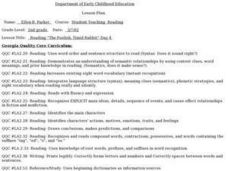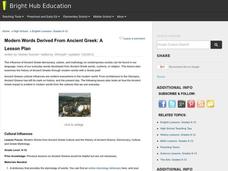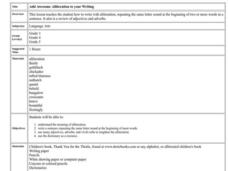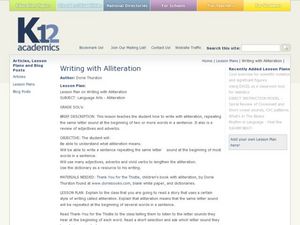Curated OER
Reduce, Reuse, Recycle
Students understand the process of recycling. They investigate how it improves the environment. They read the story "Don't Pollute" by Stan and Jan Berenstein. They analyze trash and sort it into bins.
Curated OER
How can we write a silly story?
Second graders use the writing process and create a silly story. In this silly story instructional activity, 2nd graders will review person, event and setting and complete a chart for each. Students will put a person,...
Curated OER
Angles That Pair
Students identify angles. For this angles that pair lesson, students identify adjacent, vertical, complementary, and supplementary angles. They use straws, pretzel sticks to demonstrate given types of angles.
Curated OER
Language Arts: Plotting Stories
Second graders read the story, "The Foolish, Timid Rabbit," as part of a unit on appearances. After reading with partners, they write their own stories that include elements about some forms of matter from their science studies. Students...
Curated OER
ADULT ESOL LESSON PLAN--Communicate Effectively on Health and Nutrition Topics
Students, while reviewing an extensive vocabulary list on the board, identify basic food groups with the help of picture cards. As a group, they create a collage of healthy and unhealthy foods using pictures from magazines and newspapers.
Curated OER
Freak the Mighty - Rodman Philbrick
Students read and examine the novel Freak the Mighty by Rodman Philbrick. A variety of assignments involving this novel is offered for the students to complete with higher order thinking skills.
Curated OER
Explore Chapters 1 - 5
Learners preview the novel, "Dragonwings," by Laurence Yep, make connections between the novel previewed and their prior knowledge, other texts, and the world. They utilize graphic representations including charts, graphs, pictures, and...
Curated OER
Separation of Powers: Connecting the Separate Powers
Students study the concept of separation of powers. They recognize how the Constitution provides for separation of powers and categorize public officials into one of three branches of government. Students do a role play and see if...
Curated OER
"Ivan the Fool" Lesson 1
Students in an ESL class read "Ivan the Fool", a folktale from Russia. In groups, they work with their partner to read the material and discuss what they have read. They write down any vocabulary they are unfamiliar with and write a...
Curated OER
Crossword Puzzle
In this crossword worksheet, students complete a crossword puzzle by different solving clues. For example, "Term used to describe a broad range of cultural differences."
Curated OER
Metaphor: Parts of the Body
In this metaphor--parts of the body worksheet, learners participate in describing parts of the body by utilizing metaphor phrases for a stronger description of key terms.
Curated OER
Ancient Greece
Students explore the origins of modern language. In this etymology lesson, students discuss the cultural influences of Ancient Greece on modern society. Students design and complete charts that demonstrate the original and contemporary...
Curated OER
Using Literature to Teach Bullying
Students explore signs and types of bullying. In this "building character" lesson, students listen to several read alouds based on a bully theme. Four groups are formed to discuss "gossip", "exclusion", "physical bullying", and "verbal...
Curated OER
Finding Our Bonds: King Day
Students explore the concept of philanthropy. In this service learning instructional activity, students experience literature and participate in a simulation that examines discrimination, prejudice, and stereotypes.
Curated OER
Appreciating the Men of Ballet from Dance in America: Born to be Wild: The Leading Men of the American Ballet Theatre
Students examine the role of men in the American Ballet Theatre. In this ballet lesson, students watch segments of the Great Performances video "Dance in America: Born to be Wild: The Leading Men of the American Ballet Theatre." Students...
Curated OER
Add Awesome Alliteration to Your Writing
Students explore alliteration. In this writing lesson, students read the book Thank You for the Thistle and create sentences with alliteration. Students create an alphabet booklet with alliteration.
Curated OER
Bubbles
Students observe the characteristics of bubbles. In this scientific inquiry lesson, students use a bubble solution and a wand to make bubbles and observe their characteristics. Students identify the shape and the color of the bubbles.
Curated OER
Nutrients
Fourth graders understand the important nutrients in food and the value of each. In this nutrients lesson, 4th graders complete a chart giving examples of foods that contain that nutrient and a definition of the nutrient. Students...
Curated OER
Writing with Alliteration
Students read Thank You for the Thistle and understand what alliteration is. In this alliteration instructional activity, students write sentences using alliteration. Students choose a letter of the alphabet and the class writes an...
Curated OER
Ingredients of a Mystery
Students explore the concept of mysteries. For this mystery genre lesson, students identify the common characteristics of mystery books and use a story map to identify these characteristics in a given book. Students also...
Curated OER
Decoding Strategies
Students practice using context clues to decode the meanings of unfamiliar words. In this vocabulary skills lesson, students follow the provided instructions to complete graphic organizers that enable them to decode words in "The...
Curated OER
Haunting Music
Students discover music that was inspired by the spooky and bizarre. In this music of Hector Berlioz and Camille Saint-Saens lesson, students identify elements of music and listen to the Symphonie Fantastique and Danse Macabre....
Curated OER
Introduction to "The Secret School"
Fourth graders read The Secret School and define vocabulary in the text. In this Secret School lesson, 4th graders recognize difficult text and are able to comprehend its meaning and answer questions.
Curated OER
Art and the Berlin Wall
Students study the relationship between Cold War politics, the people who were affected by it, and the artists who examined it. They create their own "walls" using a spray paint graffiti procedure.
Other popular searches
- Dictionary Skills
- Dictionary Skills Lesson
- Acronym Dictionary
- English Dictionary
- Dictionary and Thesaurus
- +Computer +Dictionary
- Dictionary Use
- Elementary Dictionary Skills
- Using a Dictionary
- +Biography +Dictionary
- Dictionary Skills Worksheets
- Dictionary Practice























